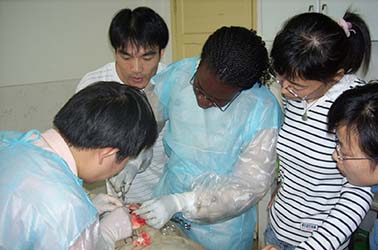 "Developing countries are increasingly embracing science and technology as central elements of national economic growth and material well-being", says Romain Murenzi, executive director of TWAS. Murenzi made his remarks at a meeting held at the International Development Research Council (IDRC) in Ottawa, Canada.
"Developing countries are increasingly embracing science and technology as central elements of national economic growth and material well-being", says Romain Murenzi, executive director of TWAS. Murenzi made his remarks at a meeting held at the International Development Research Council (IDRC) in Ottawa, Canada.
Murenzi noted that efforts to promote science and technology have been accompanied by dramatic economic reforms across the developing world over the past three decades. He also noted that educational reforms have accompanied these efforts, "enabling developing countries to produce a growing number of highly skilled workers who have been instrumental in the efforts to grow the economy and reduce poverty."
"Between 1978, when it opened its economy, and the first decade of the 21st century, China sent more than 700,000 graduate and postgraduate students abroad", he observed. The government expected only a few of these students to return. Yet, officials reasoned that even if just a small number trickled back, it would help boost China's plans for sustainable economic development over time.
Murenzi also cited India's Innovation in Science Pursuit for Inspired Research (INSPIRE) programme that offers generous stipends designed to encourage students to enrol in science courses and to pursue careers in science. He noted that in 2008, "the government of India announced plans to build 30 new universities, eight new institutes of science education and research, 20 new institutes of information and communication technologies, 1,600 polytechnic and vocational schools and 50,000 skills development centres."
In addition, he highlighted Brazil's National Research Council's Coordination for Training Higher Educational Personnel (CAPES) and the São Paulo Research Foundation as two 'enabling' examples of that country's ambitious efforts to build scientific capacity as a prerequisite for economic growth. The number of individuals graduating with advanced degrees in Brazil has increased dramatically over the past few decades and, not surprisingly, Brazil's global share of scientific publications has increased from 0.8% in 1992 to 2.75% in 2008. It now ranks 13th in the world in the production of scientific literature.
Murenzi observed that TWAS, despite its modest size, has also contributed to this effort, most notably through "the Academy's graduate and postgraduate fellowship programme that makes more than 300 fellowships available each year." The programme is conducted in partnership with Brazil, China, India, Kenya, Malaysia, Mexico, Pakistan and Thailand.
"While progress is undeniable", Murenzi cautioned, "the demand for higher education in the developing world has yet to be met." To help address this challenge, he said that TWAS, in collaboration with developing countries and international organizations, "will seek to increase the number of graduate and postgraduate fellowships it makes available each year some threefold over the next five years."
"Such an investment", he said, "would enrich the minds of the most promising young people in the developing world. Moreover, it would continue to pay dividends for decades long after the training is complete and the degree is bestowed."
"Thousands of teachers teaching thousands of students each year would serve as a valuable means for enriching both individuals and society. It is a goal," he said, "that is well worth pursuing."

